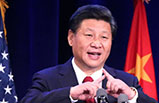China GDP growth below 7% for first time since '09
By PAUL WELITZKIN in New York (China Daily USA) Updated: 2015-10-20 11:05For the first time since the financial crisis in 2009, China's gross domestic product came in below 7 percent.
China's economic growth slipped to 6.9 percent in the third quarter, down from 7 percent in the second quarter and 7.3 percent in the year-ago quarter, according to the National Bureau of Statistics.
Sheng Laiyun, spokesman for the bureau, attributed the slowdown to weak external demand and a reduction of inventory in traditional industries such as steel and cement.
Analysts surveyed by Reuters had forecast GDP in the world's second-largest economy would rise 6.8 percent in the July-September period from a year earlier.
The results were near the Chinese government's goal of 7 percent, noted Sung Won Sohn, a professor of economics at California State University Channel Islands in Camarillo, California,
"China is in the process of unwinding the massive investment boom which created strong economic growth in the past. As investments (real estate, factories) slow, the economy is slowing. Further slowdown should be expected in coming quarters," Sohn said.
"At 7 percent each year, China is adding to the global economy an amount of supply and demand roughly equal to Italy. Everyone should be concerned about the sustainability of this," said David Roland-Holst, a professor in the agricultural and resource economics department of the University of California-Berkeley.
Huang Yiping, an economics professor atPeking University, and a member of the central bank advisory committee, said downward pressure will persist for the remainder of this year and next because the economy's traditional growth engines such as manufacturing and heavy industries are losing steam while new engines such as high value-added manufacturing and service are still developing.
"It will take quite a while to foster those industries that will drive the next roundof medium-to high growth, so I think the downward pressure will be there for a while," he said. "Policy prop-up might bring the growth up temporarily, but that's not going to last."
China's central bank – the People's Bank of China – has implemented several steps to bolster growth, including trimming interest rates and lowering reserve requirements for the banks.
"These measures usually help investments and consumption," Sohn said. "Since there is excess capacity and investments are curtailed, lower interest rates and reserve requirements won't help. However, consumption is rising at a nice clip and the measures will help."
Sohn believes that if China's GDP growth continues to stay under 7 percent,it will reverberate in the developed nations' economies.
"For every 1 percent drop in China's real GDP, US GDP falls by 0.11 percent (in the euro zoneit's 0.16 percent, Japan 0.21 percent, and developed markets 0.15 percent). Since China's economic growth has slid from 12 percent earlier to about 7 percent this year, the 0.55 decrease in the US GDP is very significant, contrary to common perception," Sohn said.
However, Roland-Holst of the University of California-Berkeley doesn't see the slowing growthas having much of an effect on the US.
"The US economy is not very trade-dependent and can continue its recovery whether China grows at 8 percent or 5 percent. The important thing is for China to stabilize its own economy, promote continued structural transition and reform, and establish reliable demand patterns for its more dependent suppliers of primary commodities," he said.
Zhu Haibin and Grace Ng of JP Morgan Chase Bank in Hong Kong said in a note that service sector growth rose from 8.3 percent in the second quarter to 8.4 percent in the third quarter.
"It is somewhat puzzling how service sector maintained strong growth in (the) third quarter given that the strong service sector growth in (the) first half was mainly driven by financial sector growth (related to the stock market boom) and (the) recent stock-market correction should have led to service sector deceleration."
Zheng Yangpeng in Beijing contributed to this report.
paulwelitzkin@chinadailyusa.com






